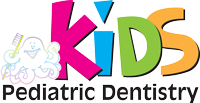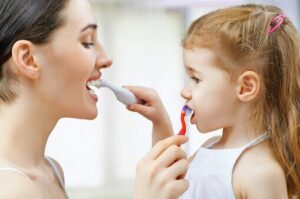Preventive dental care is needed to keep your child’s teeth healthy for a lifetime. Preventive dental care prevents the development of dental complications, tooth decay and gum disease. Good oral hygiene, brushing, flossing, a healthy diet and having regular dental check-ups keep your child’s teeth healthy. Routine dental cleaning and exams are important for your child to maintain good oral hygiene and prevent disease and decay.
Following the guidelines of the American Academy of Pediatric Dentistry, we recommend that your child see us for a dental cleaning and exam once every six months. These preventive dentistry appointments typically last between 30 – 60 minutes, and parents/ guardians are always welcome to come inside the treatment areas or wait in the lobby. Our preventive dental care tips for taking care of your child’s teeth are provided below.
Care of your Child’s Teeth
One of the most important actions you can take to keep your child’s teeth healthy is to wipe teeth and gums with gauze or clean washcloth when they are infants, and regularly brush and floss teeth as they grow up (at least twice a day). These actions will also help avoid gum disease.
Good Diet
Another very critical component of keeping your child’s teeth health is being careful with what he/she eats and drinks. As with many other aspects of being healthy, having a good diet habit will help avoid further issues as your child grows up. Like all other aspects of the human body, the teeth, bones, and soft tissues of the mouth require a well-balanced diet from the 5 major groups of foods: vegetables and legumes/ beans; fruits; whole grains and high fiber cereals; lean meats/ poultry/ fish/ eggs/ nuts; and reduced fat milk/ yogurt/ cheese.
Please also be aware of the drinks that your child ingests, and avoid high-sugar and acid drinks. Unfortunately many of the sports drinks available today fit this profile, so avoid them and get your child into the habit of drinking water to properly hydrate. These high-sugar drinks have an erosive potential to dissolve the fluoride-rich enamel in the child’s teeth, yielding to cavities. If your child drinks them, ensure they fully rinse their whole mouth and mouth guard thoroughly with water.
Preventing Cavities (Caries)
Cavities develop under 3 conditions: a host (the teeth), bacteria that lives and thrives on the teeth, and plaque (left-behind food including high-sugar liquids). The bacteria produce acids that attack tooth enamel and start the cavities. Lack of good oral hygiene increases the chances of developing caries.
Basic oral hygiene includes:
- For infants, using wet gauze/ clean cloth to wipe plaque from teeth and gums.
- For toddlers (2-3 years old) that cannot spit the toothpaste, using minimal amount of toothpaste to brush your child’s teeth (minimize or avoid fluoride).
- For older kids (4 years old and beyond), ensuring they brush their teeth at least twice a day (spitting out the toothpaste), and helping them ensure they learn how to floss at least once a day.
A good diet is critical to the healthy development of all children. Avoid unhealthy snacks and high-sugar drinks. The so call “baby bottle tooth decay” is another major problem and source of caries. This condition arises when you expose your child’s teeth to frequent and long exposures to liquids that contain sugar (breast milk, milk, formula, juices, and sweetened drinks). If you put your child to bed with a bottle, make sure it is done with water to avoid serious and rapid tooth decay.
Periodic visits to Dr. Lisi (every 6 months) are recommended to ensure proper hygiene and development of the teeth and gum.
Avoid Tobacco and Piercing
Tobacco in any form and at any age can create incurable damage and jeopardize your child’s health for life. The addictive nature of nicotine regardless of the vehicle (smokeless tobacco, spit, chew, snuff, e-cigarettes, etc.) has major negative consequences in your child’s development – in the mouth it can cause periodontal disease and produce pre-cancerous lesions (leukoplakias) that can yield to oral cancer. Educate your child to avoid tobacco completely, and watch for early signs of oral cancer if he/she uses it.
Also avoid piercing anywhere in your mouth no matter how cool it may look. To start with, hurting a blood vessel or nerve bundle can create difficult-to-control bleeding and damage to nerves. The mouth contains millions of bacteria, and they will find any means available to cause infection. Complications due to infections in the tongue, for example, can make it swell so large that it can close off your airways. Piercing can also increase the chances of chipped or cracked teeth, receding gums or scar tissue, blood clots, blood poisoning, heart infections, brain abscess, and nerve disorders.
Please avoid these 2 high-risk activities.
Routine Dental Cleaning and Oral Examination
Routine dental cleaning and exams are important for your child to maintain good oral hygiene and prevent disease and decay. Your daily home care is also critical. The professional cleanings with Dr. Lisi remove mineralized plaque that can develop despite good brushing and flossing, particularly in areas that are difficult to reach. Following the guidelines set forth by the American Academy of Pediatric Dentistry, we recommend that your child see us for a cleaning and exam once every six months. These preventive dentistry appointments typically last between 30 – 60 minutes, and parents/ guardians are always welcome to come inside the treatment areas or wait in the lobby. We encourage first-time parents/ guardians to bring babies at 6 months of age or when the first tooth erupts for the first official dental visit with Dr. Lisi – we will make it enjoyable!
Cleaning and Fluoride Application
During the appointment, your child’s teeth will be gently polished and scaled to remove the plaque and tartar from the teeth surfaces. The child will get to pick a fun toothpaste flavor like fruit punch or bubble gum while watching a kid-friendly movie.
In addition to the cleaning, your child may also have a fluoride treatment applied to their teeth that comes in a variety of flavors.
Notes on Fluoride
Fluoride is an inorganic and natural mineral that exists in our world. It has been shown to be very beneficial to the teeth. As with every element in our body, too little or too much fluoride at different ages of growth can create problems to the teeth. On the one hand, not enough fluoride in the teeth will leave the teeth vulnerable to cavities. On the other hand, excessive fluoride ingestion, especially by preschool-aged children, can lead to dental fluorosis (chalky white to brown discoloration of the permanent teeth).
Be aware that children most likely get enough (or even excessive) fluoride given its abundance: existence of fluoride in their diet; highly fluoridated toothpaste at an early age; and inappropriate use of fluoride supplements (drops, tablets, vitamins). For young children that are not able to expectorate (spit out) toothpaste with fluoride, avoid or minimize brushing their teeth with such toothpastes. Basic recommendations to decrease the risk of fluorosis in children include:
- Use clean cloth/gauze to clean baby’s gums and teeth.
- Use baby toothpaste (without fluoride) on the toothbrush on very young children.
- Use minimal children toothpaste when brushing teeth.
- Track and minimize the fluoride supplements (drops, tablets, vitamins) – babies should not get supplemental doses before 6 months of age.
- Understand the levels of fluorides consumed on your child’s diet, and check the fluoride levels on your drinking water.
- Always consult with Dr. Lisi and with your doctor before buying any supplements or if you have any questions.
Dental Digital Radiographs (X-Rays)
Dental X-Rays of the teeth will be taken as needed during their routine cleaning appointments to check for cavities in between their teeth, survey erupting teeth, diagnose bone disease, evaluate the results of an injury, or look for possible orthodontic treatment. X-Rays allow Dr. Lisi to diagnose and treat health conditions that cannot be seen by normal clinical examinations prior to them becoming major issues. All of our X-Ray equipment is digital and uses much less radiation than traditional dental X-Rays, as well as your child will also wear a lead body apron with thyroid collar during the process.
The amount of radiation received is extremely small and the risk is very negligible. The American Academy of Pediatric Dentistry recommends radiographs be taken every 6 months to every year depending on the oral health of the child, and every 3 years to obtain a complete set of either “panoramic” or “periapicals” and bitewings. If you have any concerns about X-Rays for your child, please discuss them with Dr. Lisi and our staff.
Examination
The last part of your child’s routine cleaning is a thorough examination with Dr. Lisi. This includes reviewing any X-Rays taken, examining your child’s mouth visually for problems, assessing the state of sealants (see next section below), determining the need of extractions and space maintainer, future orthodontic treatment, talking to parents/ guardians about oral health progress, and talking to your child about their teeth and hygiene when age-appropriate. If your child has decay or other problems requiring possible treatment, Dr. Lisi will discuss them with parents/ guardians, and a treatment appointment will be set for a later date.
Dental Sealants
A sealant is a clear or shaded protective plastic coating (resin) that is applied to the chewing surfaces of the back teeth (premolars and molars), as this is where most of the decay (cavities) occurs in children. The sealant prevents tooth decay by covering the pits and grooves of chewing surfaces and sealing out decay-causing food, plaque, acids, and germs. Sealants are most beneficial when placed on permanent molars as soon as the teeth come out (first set typically between ages 5 and 7, and second set of permanent molars grow between ages 11 and 14). Proper planning for the application of dental sealants can be better managed if the child attends regularly scheduled appointments – Dr. Lisi will let you know when is best to apply them.
The procedure is simple and usually takes less than 30 minutes. The teeth that will be sealed are thoroughly cleaned and dried, and the chewing surfaces are roughened with an etching solution that helps the sealants adhere to the teeth. Next, the sealant is “painted” onto the tooth and a special curing light bonds and hardens it. Sealants last for several years, and will be checked and touched up as necessary at every appointment.
Getting sealants is not painful and most children have no problem with the process. They just have to stay still and have their mouth propped open with a “tooth pillow” while the sealants are being applied. In children who have high dental anxiety or a strong gag reflex, nitrous oxide (“laughing gas”) can be administered during the sealant process to help them relax.
Mouth Guards
Mouth guards are a great investment and wonderful at preventing injuries when your child participates in recreational activities/ organized sports. They help prevent broken teeth, injuries to the lips, tongue, face or jaw. It can prevent painful, expensive and time consuming treatment later on. It is very important they fit the mouth properly to ensure a comfortable fit and your child can talk and breathe properly. Children should consider mouth guards as part of their athletic gear, whenever there is a possibility of a blow to the face and/ or mouth.
Please ask Dr. Lisi about the pros and cons of a custom-made mouth guard versus the generic ones that can be bought at stores.

